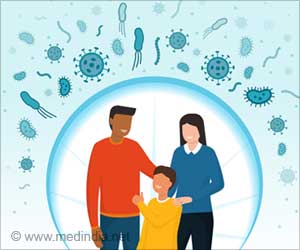The COVID-19 pandemic provides many good reasons to eat in healthier and more sustainable ways, revealed new study.

“Gardening or being part of a community gardening or local food swap group lifts social connection, reduces anxiety and stress, and improves mental health by nurturing plants out in the fresh air.”
In a new study, the researchers warn the Australian diet is not sustainable, with high rates of eating meat, excessive packaging and food waste and unhealthy consumption levels.
But how much time do people spend weighing up food decisions for their nutritional content, environmental sustainability and fairness, ask Flinders University nutrition and public health experts in a new paper in the Health Promotion Journal of Australia.
“At the supermarket and when you eat out, do you investigate where the food comes from? In an ideal world, food supply would not only be healthy but also be environmentally and socially sustainable,” Associate Professor Mehta says.
“Our dietary choices are made within a complex, powerful and unsustainable food system which contributes to rising problems of food insecurity, malnutrition, chronic disease, climate change, loss of biodiversity, and unfair food trade practices,” she says in the new study of food literacy awareness at Flinders University.
Advertisement
• The links between food production and greenhouse gas emissions
• Power, profits and fair prices for farmers
• The association between the industrial food system and current public health nutrition problems, and more.
The 47 participants of the online course – all staff and students of Flinders University – found their understanding of the food system and their attitudes towards food purchases changed to consider social and environmental sustainability, as well as health.
“Food choices that help the environment will also be healthier because people will eat more locally produced vegetables and fruits, less meat and less processed foods,” says dietitian-nutritionist Associate Professor Mehta, from the Flinders University Caring Futures Institute.
The study – the culmination of almost a decade of research into ‘food literacy’ and the effects of our food system – shows how much more can be done to improve our food supply and personal food decisions so that every bite we take considers the food’s origins and cumulative impact on the planet.
Lead researcher Associate Professor Mehta, from the Caring Futures Institute at Flinders University, says “food system literacy has not been a focus of food and nutrition Education, in spite of growing public interest in sustainable eating”.
“Food system literacy is an opportunity for people to make better food choices that are good for their health as well as the environment and farmers.”
The Flinders University food system course is now being delivered in the community by Adelaide-based social nutrition enterprise, The Food Embassy, which is running a program called Food Matters.
The paper, A critical food system program in South Australia and the effects on consumer knowledge and attitudes (June 2020), by Kaye Mehta, Hannah Rohrlach, Richard Woodman, John Coveney, Paul Ward and Sue Booth has been published in Health Promotion Journal of Australia (Wiley) DOI: 10.1002/hpja.370
Flinders University Media Release - Rethink needed for treatment of Severe and Enduring Anorexia Nervosa
Concerns over ineffective traditional treatments have prompted calls to better understand the complex processes underpinning Severe and Enduring Anorexia Nervosa (SE-AN).
SE-AN is a subgroup of people whose anorexia nervosa has become chronic, severe, and enduring – and while traditional clinical models of treatment for eating disorders focus on medical recovery, many people in this subgroup never recover in medical terms.
Researchers from Flinders University and the University of Adelaide studied a group of women in South Australia who have experienced anorexia nervosa for over 10 years but have not responded well to traditional treatments, are reluctant to change their practices or seek help for their disordered eating practices.
The research explores, from an anthropological perspective, how the women experienced SE-AN as profoundly embodied, representing a core part of their identity and how they got on in the world.
Lead researcher Dr Connie Musolino, from Flinders University’s Southgate Institute for Health, Society and Equity, says that trying to separate the mental health aspects of a person’s anorexia from their day-to-day eating and body practices was described by participants as more than the loss of an identity.
“It would dismantle their sense of being-in-the world,” explains Dr Musolino. “It structures every aspect of daily life. One participant described her anorexia nervosa as “the glue” that holds everything together.”
Dr Musolino says these findings highlight why severe and enduring anorexia nervosa becomes more difficult to treat and problematic for people to recover from.
“There have been growing calls for SE-AN treatment approaches that emphasise improving a person’s quality of life over focusing only on a full recovery in medical terms,” she says.
“We argue that experiences of SE-AN are culturally informed. Over time, everyday rituals and routines became part of that person’s structured life, and that becomes very difficult to address only in medical terms.”
The study is the subject of an article – “Embodiment as a Paradigm for Understanding and Treating SE-AN: Locating the Self in Culture”, by Dr Connie Musolino, Professor Megan Warin and Dr Peter Gilchrist – published in Frontiers Psychiatry, Vol. 11, Article 543 https://doi.org/10.3389/fpsyt.2020.00534 (published 12 June 2020). The article was published as part of the Special edition of Frontiers Psychiatry: Towards an Improved Understanding of Severe and Enduring Anorexia Nervosa.
This study was funded by an Australian Research Council Linkage grant (LP 110200179).
In recognising the need for improved SE-AN treatment, Dr Musolino applauds the push by Butterfly Foundation (a national charity for people impacted by eating disorders and body image issues) for more holistic approaches to care in the field of eating disorders.
She believes this approach can be improved by acknowledging how eating disorders are experienced as embodied and cannot be separated from the socio-cultural structures which inform them.
Dr Musolino says broadening a quality-of-life approach that works with people’s strengths and identities will help to develop greater understanding of how to best improve the wellbeing of people with SE-AN.
“A change in methods will help us to understand these people’s fear of living differently, and the safety that embodied routines bring,” she says.
Source-Medindia















